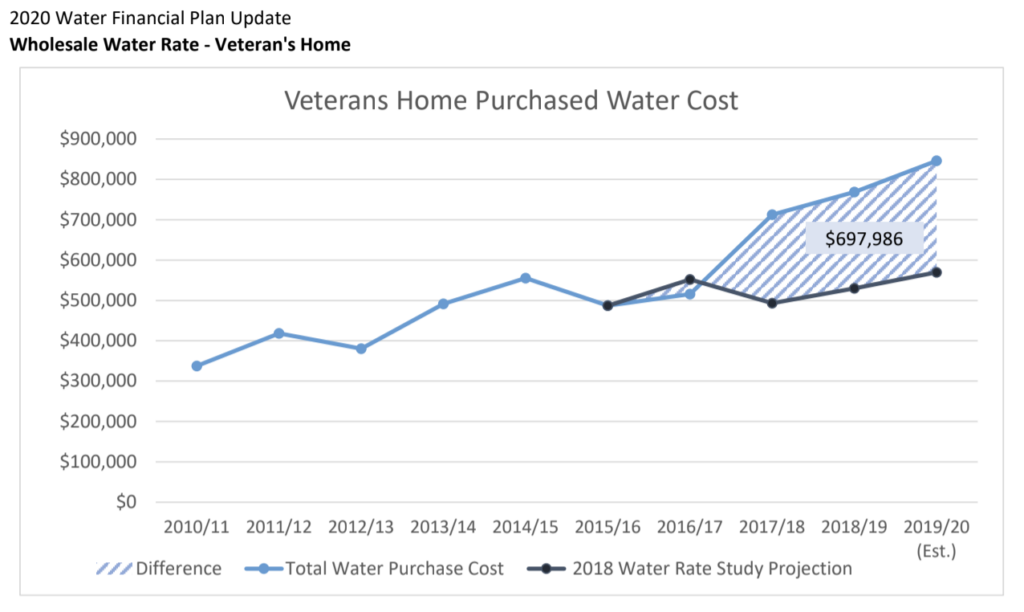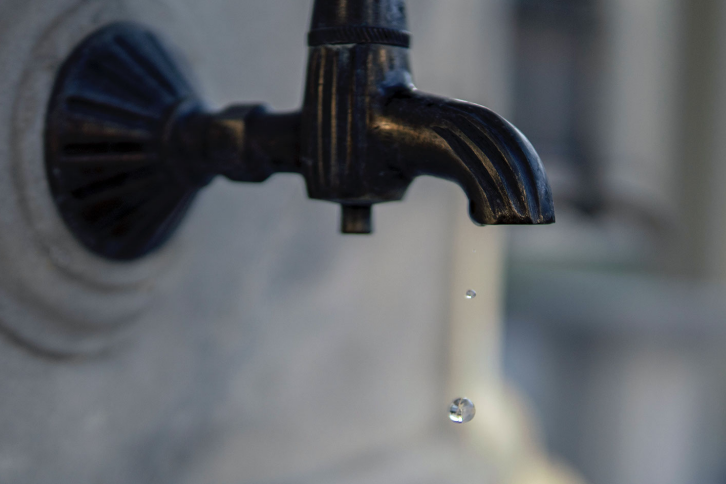Water. It is something everyone (and every living thing) needs to survive. In the last few years, water has become an increasingly hot topic in Yountville and California in general. California is, for all intents and purposes, a desert and is becoming increasingly dry, which leads to increased water issues. Water is a right. We as a community deserve to understand where it comes from and why we pay what we pay.
Where Our Water Comes From
The Town of Yountville primarily gets its water from Rector Reservoir. Rector Reservoir is located east of the Silverado Trail and is owned and operated by The State of California Department of Veterans Affairs. The reservoir forms part of the 340 acre Rector Reservoir Wildlife Area, which has 27 species of mammals, 40 species of birds, and 14 species of reptiles and amphibians. Water from Rector Reservoir is treated at the facility and then purchased by the town. The town has three connections to the State’s water main, one serving “out of town” customers east of the Napa River, and the other two connections serving incorporated Yountville. Headline local news was made last year when Rector Reservoir was shut down due to unsafe water conditions. When Rector Reservoir is closed, The Town of Yountville must purchase water, at a much higher rate, from the City of Napa. If that source was also to fail, the town has one well designated for “emergency use.”
Image from Google Maps
The Enterprise Fund
The Town of Yountville established the Water and Wastewater Utility Enterprise Fund Rate Philosophy in 2011. The fund exists to serve residents and 32 accounts located on Yountville Cross Road. As designed, Enterprise Funds are to be more like private sector business accounts. In Yountville, Enterprise Funds are used for town-operated utility services, such as water. Residents and businesses paying for those utility services cover all costs associated with the utilities. Funding for the Enterprise Fund is through the rates that residents and businesses pay for Water and Wastewater. This is different from the General Fund, mostly financed through other taxes and fees. Water rates pay for infrastructure, water supply, health and safety, fire protection, and reliability. New capital projects and ongoing maintenance are critical to maintaining these services on a sustainable basis.
The General Policy Practices of the Enterprise Fund are as follows:
- Enterprise Funds will be established for Town-operated utility services such as the water and wastewater operations.
- Enterprise Fund expenditures will be established at a level sufficient to properly maintain the fund’s infrastructure and provide for necessary capital improvements.
- The Town Council will review and adopt utility rates as needed to appropriately cover all operations costs, including maintenance, depreciation, capital, and debt service requirements, reserves as established by Town Council policy and provide for an adequate level of working capital.
- Enterprise Fund services will establish and maintain reserves for general contingency and capital purposes consistent with those maintained for general governmental services.
- Revenue bonds shall be issued only when projected operating revenues and reserves are insufficient to timely complete enterprise capital projects.
- Town Council shall continue the five (5) year phased utility rate increase for water and wastewater approved on February 10, 2011, designed to end the General Fund subsidy and operating deficits of each enterprise fund over the next five (5) years.
In the past, the Town subsidized water rates by offsetting costs with payments for the General Fund. An Enterprise Fund may not collect more revenue than is necessary to cover annual operating expenses. The Enterprise Fund is not a revenue-generating source; the Fund is to cover its costs.
How Much Does Our Water Cost?
Many factors play into how much water costs. In 2018, the Town of Yountville implemented its first water rate increases in three years to offset the upcoming cost of maintenance and the rising cost of water. At the time, the State sold water to the Town of Yountville at a rate of $1,202 per acre-foot. In 2018, Bartle Wells Associates told the Town to expect water rates to increase by 8.5% over the next five years in addition to the expected $2.09 million in maintenance included in the Capital Improvement Plan (CIP) for the next five years. At this time, Yountville Town Council approved a 7% increase in water fees over five years, a restructuring of the water tiers, and a one-time draw from the Enterprise Fund. The hope was that this increase would be enough to cover the growing expenses related to water. The Town of Yountville website has a current rate table.
In September 2020, Town Council received an update on the current water situation with the proposal for a midterm rate increase. Bartle Wells Associates, an independent public financial advisory firm, found that The Town of Yountville was not bringing in enough revenue to cover the cost of emergency water purchases and infrastructure improvements. As of the report, the town had spent over $700,000 MORE in Veterans Home water. In addition to the state’s increase, the Town also had to purchase $512,000 in water from the City of Napa when Rector Reservoir was forced offline. The report states that the town should expect a shortfall of $681,000 between FY 2020 and FY 2022. The Town also had a $1.1 expense when water lines in Washington Park failed well before they should have added insult to injury.

In the budget for FY 2021, the Town of Yountville predicts Water/Wastewater revenue to be $4.4 million and for expenditures to be $5.9 million. That is a loss of $1.5 million! You can find budget details here.
“In the case where a water system purchases water from another agency, such as the Town does from the Veterans Home/State, AB 3030 allows for what is known as a “pass-through” provision. The Town has assumed long-range financial planning that the cost to purchase water from the Veterans Home will increase 7.5% annually based on the recent five-year history of 50% cost increases. There is the possibility of a “pass-through” adjustment if the cost to purchase water is higher than the 7.5% increase amount included in the proposed rate structure. The Town could also lower a future year’s scheduled rate increase if the actual costs to purchase water is less than the anticipated 7.5% increase for wholesale water purchase.” BWA evaluated three scenarios for financial plan options for pass-through adjustments, including (a) no adjustment, (b) 50% pass-through cost recovery, and (c) 100% pass-through cost recovery. Pass through surcharges would be collected through a $/kgal volumetric charge for all users regardless of customer class to recover the annual increase in water purchase cost beyond projections in the FY 2018 rate study. We find that implementing a pass-through adjustment would provide faster fund balance recovery and revenue stability to the water enterprise while avoiding a spike in rate increases.”
The Town of Yountville is currently in year four of the five-year rate plan, with the final increase scheduled to happen in January 2022. Bartle Wells Associates recommend a “Pass-Through Plan” to help Yountville recoup some of the lost revenue. Despite this shortfall in the budget, there is no plan to raise rates mid-cycle or move forward with a pass-through plan.
CA Proposition 218 sets guidelines and procedures for water rates and implementation. Meetings must be posted and public, mailers are sent to all residences utilizing the water system. State law allows for a property owner or tenant to file a written protest to the proposed rates. The next rate study and following discussions will not happen until mid-FY21/22.
Water is technical, and this article is a bit technical. We want to give you a starting point. Hopefully, you have a better understanding of where our water comes from and what goes into providing this right. What are your questions and comments? Let us know here, and we can help us all to have a continued understanding of how our municipality works.
I have attached some documentation for further understanding of the process the Town undergoes and reviews for water rate decisions. Also included, for you history buffs, is the original agreement for the water supply between Yountville and the Veteran’s Administration.
Bartle Wells Associates: Town of Yountville – 2020 Water Financial Plan Update – Mid Cycle
Yountville Town Council Staff Report October 6 2020
Original Rector Reservoir Service Agreement
2018 Notice of Proposed Increased to Town of Yountville Water and Wastewater Rates






Thank you for this Water 101, a vital topic! Regarding water usage, can someone provide information regarding water use for vineyards vs residents? I see irrigation for vines in and around Yountville and would appreciate a better understanding regarding water irrigation of vineyards/agriculture. Is this potable water shared by residents or is this separate? Pardon my lack of knowledge on this topic, but I’d rather show my ignorance and become better informed!
Good question. The “lines” can be blurred between the Town and County and water usage. The vineyards off of Yountville Cross Road and Silverado Trail are prohibited from using Town supplied potable water to irrigate vineyards per our water service agreements.